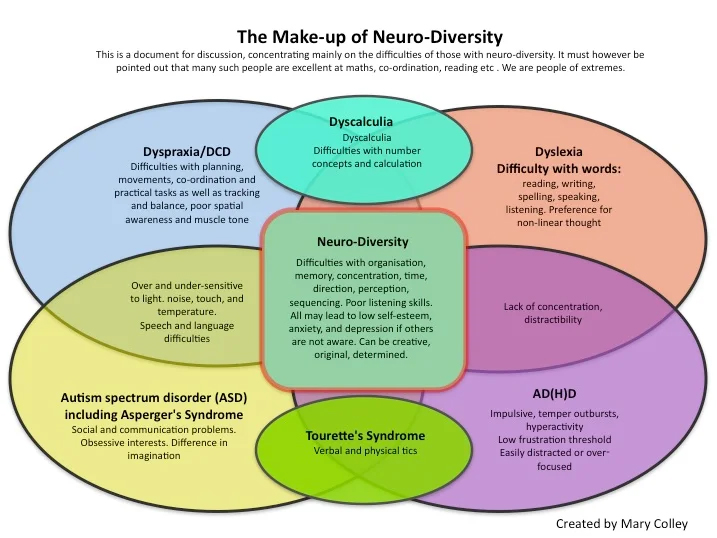What is neurodiversity?
Some people’s brains work in a different way to others. For at least 20% of the UK’s adult population, and over 30% of musicians, these differences mean they are not seen as ‘neurotypical’ and may be diagnosed with neurological conditions such as autism spectrum condition (ASD), dyslexia and attention deficit hyperactivity disorder (ADHD).
Neurodiversity is the concept that brain differences are natural variations – not deficits, disorders or impairments.
Neurodiversity describes the natural differences in how people’s brains behave and process information. Some well-known types of neurodiversity include:
- ADHD – stands for attention deficit hyperactivity disorder and affects people’s behaviour
- autism – sometimes called a spectrum condition and affects how people communicate and interact with the world
- dyslexia – mostly affects reading and writing skills and is sometimes referred to as a learning difficulty
- dyspraxia – affects movement and co-ordination
A lot of neurodivergent people do not see themselves as disabled but will often be considered as having a disability under the Equality Act.
The Equality Act gives disabled employees protection against discrimination and the right to reasonable adjustments at work. A reasonable adjustment is a change that an employer makes to remove or reduce a disadvantage related to someone’s disability.
ACAS has produced some recent guidance for employers.
Neurotypicality is used to describe people whose brain functions, ways of processing information and behaviours are seen to be standard.
Some of the general challenges faced by people with neurodiverse conditions are outlined below:
(Taken from adhdaware.org.uk/what-is-adhd/neurodiversity-and-other-conditions)
Liam Konermann writing in M Magazine says “neurodiversity is a deeply personal experience. Going through life with a neurocognitive difference – such as autism, ADHD, dyslexia, dyscalculia or dyspraxia – affects your entire way of being in the world.
Even within individual conditions such as ADHD, the presentation of symptoms is extremely variable. Many of these conditions also co-occur, meaning that an autistic person is also likely to have ADHD, and someone with ADHD is likely to be dyslexic. Combined, these conditions can have an entirely different presentation than one or the other experienced alone.
Aside from the widely-known tick box symptoms, such as distractibility for those with ADHD, neurodivergence shapes the way we relate to language, respond to sensory input, or interact in social situations.
Within the workplace, a neurodivergent person might work in a completely different way to their neurotypical colleagues. In creative industries such as music, this can be a real benefit. However, without appropriate support or the basic understanding of their colleagues, autistic people and those with ADHD or other conditions can feel left behind.”
As Liam mentions, despite the many challenges neurodiversity brings, for musicians, there are also some benefits. For example, ADHD can offer heightened levels of creativity, improvisation and focus. For those with Autism, auditory memory may be enhanced. When managing a career in music with neurodiversity it’s helpful to know how you work best and learn what you need to thrive.
Some examples could be:
- Finding structures and routines that work best for you
- Understanding the environments you work best in
- Learning how to communicate your needs effectively with those around you
- Finding effective ways to switch off and relax
What are some of the challenges facing neurodiverse musicians?
1. Time Management
Remembering appointments, keeping track of time and procrastinating can all be issues for those with neurodiversity. There are a number of tricks and tools that can help.
- Set alarms on your phone to remind you to complete certain tasks. Put an alert an hour before a calendar appointment so that you don’t forget.
- Use online tools such as Trello, Asana, monday.com or Todoist to help with organisation and project management.
- Use an Eisenhower Matrix. Find out more here (link to ‘strategies for managing creative work).
- Manage your schedule with a daily planner or a week-to-view pad which sits on your desk. Anything that is visible will help to keep you on track.
- Get started! Use the Pomodoro technique to stay focused and break down larger projects into manageable chunks. Set a timer for 25 minutes and then take a break for 5. Repeat!
2. Getting organised
- Being clear about your goals can help prevent overwhelm. Use tools to help you set them (– Smart-Goals.pdf (adhdfoundation.org.uk)-).
- Keep a list of goals somewhere visible, to remind you of what you need to prioritise.
- Create an effective filing system and stick with it.
- Use post-it notes to remind you do tasks if you struggle using apps.
3. Issues with networking
Relationships are crucial to developing your work in the music industry and can be challenging to navigate for those with neurodiversity.
The following tips and tools can help with in person events:
- Craft your pitch in advance
- Have some conversation starters
- Make connections
- Listen!
- Take advantage of opportunities
- Exit a conversation gracefully
- Follow up every time
- Make notes
- Take breaks!
Online connections can benefit from:
- Advance scheduling
- Adjusting sensory space to suit your needs
- Small groups
- Name tags
- Quiet/ breakout spaces
4. Accessing effective support
There are various ways that neurodiverse people can access support. These include:
i. Access to Work (Financial Support and Grants From The Government)
Access to Work is a government funded agency that can provide grant funding and support to those in employment with a health condition or disability. It provides individual practical support and advice to help to overcome barriers at work. You may be eligible for a grant to help with support and equipment in the workplace and ADHD Coaching.
Coaching is often very useful for people with ADHD to devise specific strategies for managing executive functions and psychosocial issues.
You might also want to consider a self-referral to Access to Work Mental Health Support Services. This is a Government funded service that provides confidential and vocational support for employees with mental health problems to retain their ability to participate at work.
Support is provided for a period of 9 months. You can find out more by calling the confidential helpline: 0300 456 8114 or emailing atw@maximusuk.co.uk
Ii. Getting support with welfare benefits
If applicable to your circumstances, a good starting point would be to explore the welfare advice and support that may accompany your membership(s) to a union(s) and/or performing rights organisation(s).
PRS Members Fund can provide further help and support and other organisations can help. They will check that you meet their eligibility criteria, which may include asking you for information about your professional and financial situation, including savings and property.
Where organisations require clinical information, BAPAM can provide you with an independent, expert, confidential medical assessment and report, which you may use to support an application for financial support:
Sources of Financial and Practical Support | BAPAM
If you require support with the application process, we would always recommend that you contact the organisation that you’d like to apply to for support in the first instance, either by phone or email. Someone working within that organisation would be best placed to talk you through the eligibility criteria, and options for support with the processes involved.
Help with completing forms is usually available via the organisation you are applying to but the organisations below can also help:
- Your local Citizens Advice Bureau
Iii. Accessing support for live performance
Use the Musicians’ Unions ‘Access Rider’ tool to help identify and communicate your access needs. Their website explains:
“An access rider is a document that details your access needs. Access riders are used by disabled artists to ensure that their access needs are met so they can do their job.
Conversations about access can be difficult and some people struggle to communicate their needs fully. An access rider is an easy way to clearly communicate your access needs to anyone that you’re working with, and start a conversation about what you need to do your job.
Using an access rider can help everyone feel confident in their working relationships with each other.”
Find out more here: musiciansunion.org.uk/legal-money/workplace-rights-and-legislation/equality-rights/disabled-musicians-rights-and-support-at-work/access-riders-for-musicians
Additional Resources:
Creative-Differences-Handbook.pdf (umusic.co.uk)
Neurodivergent Musicians at Work | Musicians’ Union | – Neurodivergent Musicians at Work | Musicians’ Union | The MU (musiciansunion.org.uk)
Support for disabled musicians – Independent Society of Musicians (ism.org)



